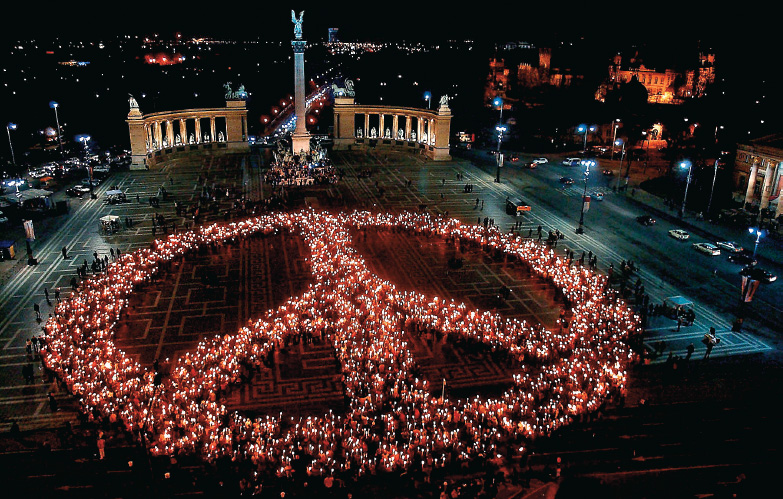A History of Western Society: Printed Page 1037
A History of Western Society, Value Edition: Printed Page 1053
Promoting Human Rights
Though regional differences persisted in the twenty-seven EU member states, Europeans entering the twenty-first century enjoyed some of the highest living standards in the world, the sweet fruit of more than fifty years of peace, security, and overall economic growth. The recent agonies of barbarism and war in the former Yugoslavia as well as the memories of the horrors of World War II and the Holocaust cast in bold relief the ever-present reality of collective violence. (See “The Past Living Now: Remembering the Holocaust.”) For some Europeans, the realization that they had so much and so many others had so little kindled a desire to help. As a result, European intellectuals and opinion makers began to envision a new historic mission for Europe: the promotion of domestic peace and human rights in lands plagued by instability, violence, and oppression.
European leaders and humanitarians believed that more global agreements and new international institutions were needed to set moral standards and to regulate countries, leaders, armies, corporations, and individuals. In practice, this meant more curbs on the sovereign rights of the world’s states, just as the states of the European Union had imposed increasingly strict standards of behavior on themselves in order to secure the rights and welfare of EU citizens. As one EU official concluded, the European Union has a “historical responsibility” to make morality “a basis of policy” because “human rights are more important than states’ rights.”18

In practical terms, this mission raised questions. Europe’s evolving human rights policies would require military intervention to stop civil wars and to prevent tyrannical governments from slaughtering their own people. Thus the EU joined the United States to intervene militarily to stop the killing and protect minority rights in Bosnia, Croatia, and Kosovo. The EU states vigorously supported UN initiatives to verify compliance with anti–germ warfare conventions, outlaw the use of land mines, and establish a new international court to prosecute war criminals.
Europeans also broadened definitions of individual rights. Having abolished the death penalty in the EU, they condemned its continued use in China, the United States, and other countries. At home, Europe expanded personal rights. The pacesetting Netherlands gave pensions and workers’ rights to prostitutes and provided assisted suicide (euthanasia) for the terminally ill. The Dutch recognized same-sex marriage in 2001. By the time France followed suit in 2013, nine western European countries had legalized same-sex marriage and twelve others recognized alternative forms of civil union. The countries of the former East Bloc, where people were generally less supportive of gay rights, lagged behind in this regard.
Europeans extended their broad-based concept of human rights to the world’s poorer countries. Such efforts often included sharp criticism of globalization and unrestrained neoliberal capitalism. For example, Europe’s moderate Social Democrats joined human rights campaigners in 2001 to secure drastic price cuts from international pharmaceutical corporations selling drugs to combat Africa’s AIDS crisis. Advocating greater social equality and state-funded health care, European socialists embraced morality as a basis for the global expansion of human rights.
The record was not always perfect. Critics accused the European Union (and the United States) of selectively promoting human rights in their differential responses to the Arab Spring — the West was willing to act in some cases, as in Libya, but dragged their feet in others, as in Egypt and Syria. Attempts to extend rights to women, indigenous peoples, and immigrants remained controversial, but the general trend suggested that Europe’s leaders and peoples alike took very seriously the ideals articulated in the 1948 UN Universal Declaration of Human Rights.